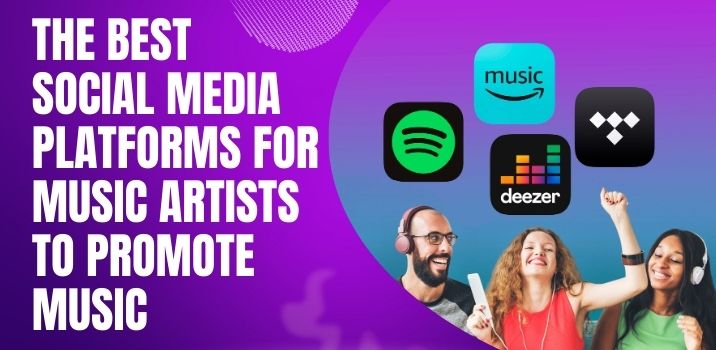Where Should You Promote Your Music in 2025? The Real Pros and Cons of Every Major Platform

30-April-2025
Music artists experience a major transformation in their career through social media channels. A properly chosen platform helps music artist build relationships with their fan base and increases streaming performance while attracting record industry professionals. Selecting which platforms to leverage requires careful consideration because of all the available choices. Your music style determines which platform will succeed best for your promotion goals since different platforms have unique ways of working. The path to standing out leads artists toward recording studio in Los Angeles so they can refine their sound until it becomes ready for major success. The search for professional music studios in LA provides artists with an opportunity to advance their sonic quality. We will examine which social media networks work best for marketing music alongside effective practices for their utilization.
Instagram is all about eye-catching content, making it perfect for music artists to showcase their style. From behind-the-scenes clips to album teasers, Instagram Stories and Reels help keep fans engaged. Consistent posting and interactive features like polls and Q&As strengthen fan connections.
Pros:
· Strong visuals boost fan engagement.
· Reels and Stories increase visibility.
Cons:
· Algorithm limits organic reach.
· High competition for attention.
TikTok:TikTok’s short-form videos make it a game-changer for music promotion. Catchy hooks and creative challenges help songs go viral, boosting streams overnight. Engaging with trends, duets, and user-generated content increases visibility, making TikTok a must for artists aiming for rapid exposure.
Pros:
· Viral trends can skyrocket exposure.
· Short videos attract quick engagement.
Cons:
· Trends fade quickly.
· Music discovery depends on algorithm.
YouTube offers a home for high-quality music videos, live performances, and in-depth storytelling. Artists can build a dedicated fanbase by posting official releases, behind-the-scenes footage, and tutorials. A well-optimized channel helps music reach a global audience and enhances credibility. Many artists also refine their content in music studios in LA before releasing their work, ensuring top-notch production quality.
Pros:
· Great for high-quality video content.
· Builds a long-term fanbase.
Cons:
· Requires consistent video uploads.
· Monetization takes time.
Real-time engagement with FansX (formerly Twitter) is ideal for quick updates, real-time engagement, and direct conversations with fans. Music artists can use it to share new releases, industry news, and personal thoughts. Hashtags and trending topics help increase reach, keeping fans constantly engaged.
Pros:
· Real-time updates keep fans engaged.
· Hashtags boost music discoverability.
Cons:
· Short lifespan for tweets.
· Organic reach is unpredictable.
Facebook is perfect for forming a loyal fan community. Artists can create pages, share music updates, and interact through live videos. Facebook Groups allow deeper fan engagement, while event promotions help boost concert and merch sales to a broader audience.
Pros:
· Strong community-building potential.
· Live videos enhance fan interaction.
Cons:
· Declining engagement for pages.
· Algorithm favors paid promotions.
SoundCloud and Audiomack provide a launchpad for exposure. These platforms allow artists to upload music, gain organic listeners, and attract record labels. Free streaming options and direct fan feedback are great for testing new sounds.
Pros:
· Great for independent artists.
· Direct feedback from listeners.
Cons:
· Limited monetization options.
· Requires external promotion.
Twitch isn’t just for gamers it’s a powerful tool for music artists to live-stream performances, studio sessions, and Q&As. Engaging with fans in real time builds a dedicated following. Subscription-based revenue also gives artists another way to earn from their craft.
Pros:
· Live streaming builds deep connections.
· Subscription model offers extra income.
Cons:
· Niche audience for music.
· Requires consistent streaming schedule.
Spotify helps artists gain traction through playlist placements and algorithm-driven discovery. Submitting music to curated playlists increases exposure while maintaining an active profile with new releases, artist picks, and fan interactions enhances streaming performance.
Pros:
· Playlists help increase streams.
· Algorithm boosts music discovery.
Cons:
· Payouts per stream are low.
· Hard to get on top playlists.
Choosing the Right Platform for Your Music Style
Not every platform suits every artist. Visual storytellers thrive on Instagram, while those chasing viral fame do well on TikTok. Artists focused on polished content benefit from YouTube, while SoundCloud is great for emerging talent. Before releasing music, recording in a recording studio in Los Angeles ensures professional sound quality, helping artists stand out in a competitive industry.
Conclusion:
Social media isn’t just about posting it’s about connecting with fans in ways that feel real. Building consistent interactions alongside constant video content creation on TikTok and Instagram and Twitch live streaming generates the best results for music promotion. Success is found through testing while monitoring productive methods on actual fan-targeted platforms. Before launching your music to a global audience, recording in a recording studio in Los Angeles provides the professional sound needed to make an impact. With so many music studios in LA offering high-end equipment and expert production, artists can ensure their music are mixed and mastered to perfection. Artists seeking a professional recording studio to finalize their sounds before worldwide release should consider MIX Recording Studio for bringing their sonic masterpieces to life.